- Administrator
- Albums and Singles
 Presented as a follow up to 2004's Grapes from the Estate, this album continues Ambarchi's exploration of crystal clear ambience. Sharing the same mix of patient tempos and penetrating subsonics, these songs could fit unnoticed right beside their predecessors. The difference emerges in the details, and the increased use of untreated guitar, strings, and voice makes for a understated yet compelling departure.
Presented as a follow up to 2004's Grapes from the Estate, this album continues Ambarchi's exploration of crystal clear ambience. Sharing the same mix of patient tempos and penetrating subsonics, these songs could fit unnoticed right beside their predecessors. The difference emerges in the details, and the increased use of untreated guitar, strings, and voice makes for a understated yet compelling departure.
For a while, I had trouble placing Ambarchi in Southern Lord's aesthetic. Despite his notable contributions as a Sunn O)) and Grave Temple Trio member, his solo material seemed removed from the label's doom and sludge metal mainstays. The one notable connection being the obsessive use of sub-bass. The booms and cracks of Ambarchi's mangled guitar mimic the detuned riffing of doom metal, but with the distortion scrubbed completely off, leaving only a chest rattling thud. Before, these heavier elements were balanced out with chiming tones and jazzy drum fills. The mood of In the Pendulum's Embrace is darker and the rhythms plodding, more of kind to Ambarchi's collaborative work for the label.
The label-centric similarities don't end with Ambarchi's amp-worship. The spacious twang of "Fever, A Warm Poison" is reminiscent of Dylan Carson's recent clean, countrified sound. Because of his unique arrangements, Ambarchi avoids the dreary repetition Earth can get mired in. Piano, bells, and processed harmonics merge together sounding like a continuum of the same tone rather than separate instruments. These jagged but tightly interlocked elements provide a solid base for the Ambarchi's electric guitar to meander over.
Ambarchi shines most on his more subtle compositions. On "Inamorata" a string section gradually swells in, vibrating the song into a tremulous boil. But instead of reaching the expected crescendo, the strings vanish, like a departing gust of cold air. "Trailing Moss in Mystic Glow" gently ends the album with acoustic finger picking and the surprising addition of vocals. Ambarchi sings wordlessly, confining himself to soft moaning. That brief touch of humanity softens the dour mood of album, ending it with a delicate and plaintive fade out.
When first listening to the album, I was worried that Ambarchi would simply repeat Grapes from the Estate and settle into a single style of playing. That's not the case. Instead, Ambarchi borrows the best from what is around him, enriching his already diverse body of work.
samples:
Read More
- Administrator
- Albums and Singles
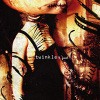 This duo issue their first album ("The Toy" in English) two years after their Audiotrauma Processing Industry EP, in a joint release between that label and Ant-zen. Le Jouet explores the many different aspects of toys, from those that children play with to those used by adults, either in role-play or, as they claim, those "deadly weapons used like toys by grown-ups who can never negate the children they once were." The duo do this by utilizing a combination of beat styles, samples, and ambient passages together with distorted vocals and simple melodic structures, ranging across a variety of styles in the process.
This duo issue their first album ("The Toy" in English) two years after their Audiotrauma Processing Industry EP, in a joint release between that label and Ant-zen. Le Jouet explores the many different aspects of toys, from those that children play with to those used by adults, either in role-play or, as they claim, those "deadly weapons used like toys by grown-ups who can never negate the children they once were." The duo do this by utilizing a combination of beat styles, samples, and ambient passages together with distorted vocals and simple melodic structures, ranging across a variety of styles in the process.The two men responsible, Yves Cornu and J.B. Leduc, in taking all these styles have concocted a wide-ranging mix of songs. Certainly they have tried to keep moving stylistically, refusing to be constrained by any boundaries or particular genre parameters. It is all too easy these days, given the democratization of (musical) technology and the ease of access to it, for people to simply regurgitate what has gone before, then record, package and release it. Twinkle are to be commended for avoiding that trap, instead giving us a varied but solid set of thematically-linked songs. Despite that variety, there exists a coherence binding the entire album together, especially in the latter half where everything takes on a much harder edge. I heard a definite linear progression from innocence to darkness, from the inventive play of children to the 'games' of adults, with their sexual and dominatory subtetxs.
Even the military uses the term 'war-games,' which implies a form of play, a euphemism disguising the true intent of the exercise. From beginning to end there is a wonderfully subversive and sinister undertone running beneath the playful surface, especially noticeable in the first half of the album, which emphasizes the true nature of toys, play, and games, with the often hidden facets of politics and dominance. After all, this is how children learn about social interaction: lessons which are often carried through into later life, for better or worse.It is that undercurrent of subversion and deviousness that does it for me. The third track "Ton Style" is an example: initially it starts out as music-boxy but as it progresses it takes on more and more of a soiled edge until finally it ends with a dirty and distorted stutter, the song suffused with a subtle anger and malevolence. The next track, "La Victime Volontaire," is ostensibly a hip-swinging middle-eastern influenced number but perhaps it takes on a deeper and darker significance in today’s political climate; I can imagine how the sentence I used from the press-release in my introductory paragraph above could apply here.
The highlights of the album, the ultimate confluence of all the themes and ideas that form the various streams feeding into this album, are tracks eight and nine, "Le Joueur" and "Tu es Perdu" respectively, particularly the former, even though it only lasts for just under two minutes. There is something shiver-inducing about the use of a 'jolly' child-like melody coupled with speeded up samples and children singing over a distorted dance-floor workout. The following track is a full-on tribal stomp that wants to get you up and moving your feet, however reluctantly.
I haven't listened to rhythmic industrial since Frontline Assembly's Millennium, feeling at the time that the genre had run out of both steam and originality. On hearing this offering though I have come to realize though that I may have a bit premature in my assessment. Certainly I have heard considerably worse.
samples:
Read More
- Administrator
- Albums and Singles
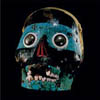 It's good to know that rock music isn't truly dead. Sure, the coroner has been called out many times to check the corpse, but as long as albums like this are around, there will be a bit of pulse left in the ol’ body. Here is yet another recontexualization of the various fragments of rock in the past four decades into a unique brew that doesn’t specifically sound like any previous band, but the vibe of their legacies are definitely there.
It's good to know that rock music isn't truly dead. Sure, the coroner has been called out many times to check the corpse, but as long as albums like this are around, there will be a bit of pulse left in the ol’ body. Here is yet another recontexualization of the various fragments of rock in the past four decades into a unique brew that doesn’t specifically sound like any previous band, but the vibe of their legacies are definitely there.
It's not tough to hear fragments of 1960s and '70s hard rock, a bit of progressive rock, a dash of 1980s post punk, and more contemporary sludge and drone metal. The opener, "Things Will Grow" makes for probably the most conventional piece to be found here with its pounding tribal drum opening (channeling Big Paul Ferguson from vintage Killing Joke) over which some harsh grating post-punk guitar lines and buried echoed vocals. Again, there are vestiges of other bands in the sound, but nothing that feels stolen or copied, just influenced.
That overblown "prog" sound does rear its Rick Wakeman attired head in a few of the longer tracks, but in the best possible way. Rather than through pretentious soloing or flute solos by elves, it is more in the form of longer tracks with more dynamic variation, like the closer. "Nervous Buzzing" starts out minimal and stripped down over electronic vibrations before slowly segueing in guitar and drums which blast into full on chaotic noise. It then ends on a gentle duo of bass and guitar. Even more prog is the 18 minute "Magic Jordan," which opens slow and with a choral backing that slides into some good old '70s hard rock riffing that gets thicker as the vocals get more and more harsh and violent. It is eventually stripped away into chimes and guitar solos much less violent but more expansive.
The sound never goes into full on wankery, thankfully. Things do stay more grounded in a hard rock vibe though, like the vaguely Sabbath guitar and chaotic drums with melodic (but still metal) vocals on "Tungsten Steel-Epilogue" that speeds up to hardcore thrash for a while and then slows WAY down to Khanate-like glacial pace. The more blues-rock lurch of the genre creeps in on "Kross," which becomes more about the space between the distorted riffs than the actual guitar.
It is always refreshing to hear different takes on rock/metal, considering how stagnant the genre seems to be at times. Just as soon as it seems like there is nothing new to happen, a band like Wildildlife comes along and puts a new spin on things while keeping true to their roots to give listeners a frame of reference that feels familiar, but still new.
samples:
Read More
- Administrator
- Albums and Singles
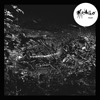 The cover photograph of this disc paints a darker picture than is actually to be heard. Which is not to say that this release doesn't continue Utech's ARC series of dark, opaque experimentalism, it just has some serene, beautiful elements that are not immediately apparent from the pseudo-1930s crime scene looking photo that adorns the front cover.
The cover photograph of this disc paints a darker picture than is actually to be heard. Which is not to say that this release doesn't continue Utech's ARC series of dark, opaque experimentalism, it just has some serene, beautiful elements that are not immediately apparent from the pseudo-1930s crime scene looking photo that adorns the front cover.
Sachiko, also a member of Overhang Party and Kosokuya, apparently works in a more psychedelic context most times, but here is delving mostly into purely "bad trip" territory. The dark ambient opening of "Dmu-Bdud Kam-Po So-Zan" with its drifting dark tones and sinister disembodied sounds like traversing through unexplored oppressive caverns. Harsher noise elements are here as well like the blasting loops of what could almost be a mutilated trombone in "Route 21" strewn atop a vaguely musical, but no less bizarre backing loop.
Tracks in which Sachiko includes her own vocals make for the most disturbing on the whole, like the cut up fragments of voice that are processed like creepy little children from beyond, like almost any Asian-inspired horror movie in the past 10 years. The culmination of this vibe is "The Voice From The Border," which stacks up scraping electronic noise and feedback squall with inhuman screeches and other vocalisms that rival that of any Hollywood voiceover artist. It is seriously creepy, disturbing sonics that pushes it into a dark place that rivals anything similar I have heard in the past year.
I referred to the fact that as a whole the album is no as dark as the artwork would indicate, and if the disc were to end here, I would be wrong. The final two tracks help elevates the disc from the ninth circle of hell and more into purgatory. "Gakida No Mori" takes the vocals and cut them up into a chanting motif that, even with the deep tones and rumbles feels somewhat lighter than what preceded it. However, the closing "Chiacona Und Konzert In G Moll" strips away the noise elements and centers itself more on soft, ethereal vocals that are really quite beautiful and constitute the entire track with the exception of some subtle background hissing.
I must take my hat off to Keith Utech for putting together this ARC series. As it is winding down (I just received the final two discs earlier this week and will be covering them very soon), it is not hard to reflect on all of the volumes and see just how many up and coming artists in the whole experimental/avant garde scene have been presented here, all complimented nicely with Max Aguilera-Hellweg's great photographs. Kunado is yet another great installment from an artist I had never heard before, but will definitely be looking for in the future.
samples:
Read More
- Anthony Locke
- Albums and Singles
This truly is a a fantastic CD of raw, early recordings from 1987 which were given to the comic creator and ex- Polvo drummer almost 20 years ago. The tracks imply the fury that the band would harness during their illustrious, monolithic career. It's a collection of good old 4-track recordings from the post Gluey Porch Treatments period. Perhaps it is a little rough around the edges but that's natural for a recording of this nature / period. It presents the group (to me one of the most important heavy rock bands of the 20th century) at their infancy and yet with a clear idea of their sound and direction.It is full of killer riffs, ace songs, and total heaviness (which isn't clear in the overall sound but all those who had been there at the recording would have been skull fucked).
This is a band at their most primal and innocent. No one can fuck with lyrics like "you disgrace me... Now you learn what it's like to cry" and "Repelled at just the site." 21½ minutes leaves me wanting more, yet I must remain grateful that these recordings were ever unearthed in the first place. Recent converts to the church of the Melvins may be disorientated a little, however, as this serves as an education to their roots and is an essential document of the bands history. In King Buzzo's guitar riffs lie the early ideas for "Anaconda" from classic their Bullhead LP and uber classic "Nightgoat" tune.
Meanwhile the comic book has some moments of genius punk rock parody and cartoonism. It is absolutely crushing stuff. This will surely (and maybe sadly) become the stuff of the infamous online bidding Web site legend.
Read More
- Administrator
- Albums and Singles
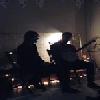 With the freak folk empire still flying its tattered psychedelic flag, it a relief to see Dumb Supper arriving on the horizon unconcerned with scrambling the folk format. Mainly a collection of traditional re-tellings, the Tylers manage to both stay true to the form's roughened simple roots.
With the freak folk empire still flying its tattered psychedelic flag, it a relief to see Dumb Supper arriving on the horizon unconcerned with scrambling the folk format. Mainly a collection of traditional re-tellings, the Tylers manage to both stay true to the form's roughened simple roots.
Relying on acoustic guitar and voice, the album has a stripped and sinewy organic feel that keeps the whole thing together. With the simple production the songs feel like they were recorded informally by some warm communal pub hearth. The only thing missing from "Queen Sally" is an ending of clinking glasses and a smattering of applause. Cath and Phil's vocals seem to slip in and out and harmony, the song's rough hewn beginnings find Phil's vocal grow in strength to a grave dancing finale. It is Cath's voice that is the main draw here, at times flightily youthful and other times like an unschooled instrument feeling its way through notes for the first time. With the melancholy melody of "Wether Skin," Cath inhabits the song like the lyric actually happened to her. Her soft anger comes over like weathered leather, her performance showing a lot of heart as a subtly performed piece of empathic characterisation. Cath avoids the narrative pitfall of delivering the killer closing lines with an aural nod or wink. Instead her delivery is weighed with an emotional knowledge.
While much of Dumb Supper is relatively straight it certainly isn't po-faced, there is heart, sprit and tenderness in what they have done here. The uncomplicated three minute lullaby "Baby's Boats" wraps up everything a parent feels for their child in a preciously floating melody. Amongst the more energetic highlights are the bucking banjo of "Yellow Hammer" and the plucky "Fisherman's Girl." The skirt swishing narrative stomp of "Devil Song" is filled out with curtseying violin and Jews harp, kicking up the song's sawdust. The new melody stilting threaded to "Death of Queen Jane" infuses a little modernity into the lyric, the spare guitar playing sounding as hesitant as the vocal delivery is worn. Even when "Wild Stormy Deep" evokes the steps of a Deep South front porch, the pair refuses to sit in Americana's pocket. These tellings feel like they have been stripped and revitalised, taken back to the root and re-told without the trimmings.
samples:
Read More
- Administrator
- Albums and Singles
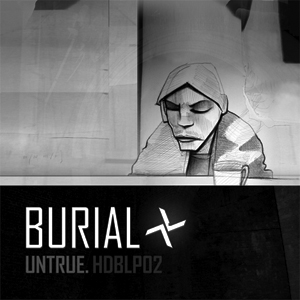 In 1997, Bristol's trip-hop troubadours Portishead released their self-titled sophomore album, a deeply moving account of agonizing, feverish love and world-weary heartbreak. Its forlorn brilliance stunned me, leading me to privately refer to it as the soundtrack to a suicide. Now, another British electronic musician follows up a critically acclaimed breakthrough with a superlative sequel that, for me, shares both that ominous honor and my firm vote for Album of the Year.
In 1997, Bristol's trip-hop troubadours Portishead released their self-titled sophomore album, a deeply moving account of agonizing, feverish love and world-weary heartbreak. Its forlorn brilliance stunned me, leading me to privately refer to it as the soundtrack to a suicide. Now, another British electronic musician follows up a critically acclaimed breakthrough with a superlative sequel that, for me, shares both that ominous honor and my firm vote for Album of the Year.
Hyperdub
Although both acts employ liberal sampling policies in their recordings, where Portishead featured lush maximal production, Untrue succumbs instead to the understated aesthetic power of ascetic piety, self-flagellating while furnishing unexpected perverse indulgences in the empty spaces between figurative whip cracks. The carefully selected, vigilantly spliced vocal samples belie a consuming sadness in the soul, both of the man and his music. The revelation of a few of the original sources behind these samples sparked a ridiculous argument about copyright infringement on a prominent online forum, just one example of the divisiveness and rabidity Burial’s music leaves in its wake. In the end, it doesn't matter whether or not the unstoppable, jaw-dropping anthem "Archangel" co-opts bits of Ray J's "One Wish" or that "Etched Headplate" subtly appropriates and elegantly warps also-ran Amanda Perez’s perhaps best known tune. Rather, what should drive the debate is just how the artist lovingly though mercilessly utilizes this material to construct entirely different songs.
Pregnant with sacrosanct significance, Untrue follows zealously along its conceptual path with hardly any deviation from its aseptic mix of muted 2-step garage beats and uncompromising atmospheres. Formula can often kill album-length releases in single-oriented electronic music subgenres, but it works faultlessly here on cuts like the indomitable "Shell of Light" and "Ghost Hardware," the latter released on vinyl as well as digitally as a teasing prelude to the album. As on his first full-length, Burial dodges the bullet of monotony by interspersing curious ambient passages among the stuttering rhythmic tracks. Although on the surface "In McDonalds" might be a stupid name for a track, the gravity in its woefully brief duration negates any concern or skepticism with obtuse crackles and pads, punctuated at the very end by three simple but contextually hefty words: "you look different."
Entombed by the cumulative emotional weight of these 13 devastating new productions, I reluctantly wonder whether the pseudonymous recluse known as Burial isn't himself in a dire, depressive state of mind. How could an artist in isolation compose such gorgeous, tortured music and not give serious consideration to desperate, baleful thoughts? Where some find themselves inescapably awestruck and inspired by the beauty of Buria'’s obscured soul, his music actually troubles me to my core. The detatched moans on the penultimate track "Homeless" leads me to picture a sullen young man brooding in the corner, sobbing genuinely and despondently. Untrue isn't uplifting but self-destructive, overflowing with a poisonous despondency. This should be taken as a warning sign. Someone please reach out and give this lonely, talented man a call tonight.
samples:
Read More
- Administrator
- Albums and Singles
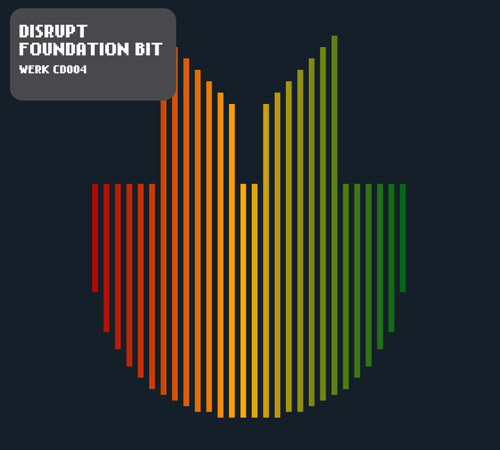 For those who don't frequent the sites of MP3-only, Creative Commons-licensed netlabels, Jan Gleichmar's Jahtari is a go-to virtual imprint enamored with the long-departed sounds of 80s digital dub and dancehall reggae. Since 2004, his simulated 7" releases both there and elsewhere in the netlabel world built up enough of a reputation to warrant this physical release to showcase his balmy eight-bit informed productions.
For those who don't frequent the sites of MP3-only, Creative Commons-licensed netlabels, Jan Gleichmar's Jahtari is a go-to virtual imprint enamored with the long-departed sounds of 80s digital dub and dancehall reggae. Since 2004, his simulated 7" releases both there and elsewhere in the netlabel world built up enough of a reputation to warrant this physical release to showcase his balmy eight-bit informed productions.
From rigid digital steppers to syrupy classic video-game console versions, Foundation Bit provides ten immensely gratifying tunes that could have easily come to us via time capsule as much as a modern bedroom studio. At least half of the material on this, a compilation of some of his best cuts as Disrupt, was previously available for free through Jahtari, though Gleichmar wisely "deleted" those tracks in advance of this new CD for free-spirited independent Werk Discs. That strategic move could serve as a good business model for other artists coming up through these legitimate online file-sharing communities.
Gleichmar clearly romanticizes not only the history of Jamaican music but also a now-quaint sci-fi futurism embraced by many of his predecessors, often fetishizing through the use of speech samples targeted at trainspotting geeks. "Blast You To Bits" and "Bomb 20" achieve this with almost comical effect, though their sturdy foundations keep them tough enough. While "True Creators" nods appreciatively in the direction Sheffield bleep legends LFO, pilfering the robotic hook from "We Are Back," "The Stars My Destination" sets its sights firmly on dub pioneers like King Tubby and Scientist. Similarly, "THC 1138" channels King Jammys' classic Sleng Teng vibe with a suspiciously accurate mechanized bass tone, straddling a dangerous line between homage and emulation like much of the material here between.
The digipak offers little information about the artist or anything else for that matter, an especially frustrating problem when I came upon "Jah Red Gold And Green," the best track of the bunch. Thanks to an official Wackies CD-R that I snagged one fine afternoon at Jammyland, one of New York's best shops for reggae music, I was already familiar with a vocal take of this track done recently by Wilbur "Stranger" Cole, known by many ska collectors for his work in the '60s. Although the version here features a brief echoed snippet of Cole's verse, I am unable to determine if this is an original Disrupt riddim or a homemade remix. While it does not take away from the track's wondrously simplistic melody, dissonant deepness, and gratuitous SID chirps, it leaves me second-guessing as to whether or not I actually like Disrupt's Foundation Bit or just his blatantly demonstrated adoration for his influences.
samples:
Read More
- Administrator
- Albums and Singles
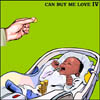 With 2 CDs and around 57 tracks, there's a lot of bang for the buck here, so long as various forms of electronic noodling is a plus, and thematic cohesion is something to stay away from.
With 2 CDs and around 57 tracks, there's a lot of bang for the buck here, so long as various forms of electronic noodling is a plus, and thematic cohesion is something to stay away from.
The only real consistency on this compilation is the electronic nature of the tracks. Putting the spazcore video game techno of Alien Hand's "The One and Only Time You Touch the Boys of Malin" on the same disc as the restrained ambient pad synths of Subsonika's "Bitch" is an odd proposition, but curator Mixomatosis decided to do just that. As someone whose taste in electronic music as a whole ranges from "it's ok" to "I love it" depending on the subgenre, I had a similar perspective on this disc. But honestly, it works better than I expected in most situations. For example, I would never consider myself to be a big fan of gabber (the late '90s techno variant where 909 drum machines are used like Mac-10s), but Peter Z & Lispent's "Jagtvej 69 (Tribute)" is exactly that, and I caught myself enjoying it.
Although it admittedly runs the gamut of styles, one glance at artists such as Stuntcock and Mr. Cunt makes me inclined to believe that the next Iannis Xenaxis is most likely NOT hiding amongst these tracks, but as a whole, it functions as a great corollary to the more scatological end of the grindcore spectrum. But with a greater variety in style….as a fan of that stuff as well, I know even I would be hard pressed to discern Anal Cunt from Agoraphobic Nosebleed in many contexts, but that's not as much of a difficulty here.
Some of the contributions are purely comical in nature, such as the aforementioned Mr. Cunt's mushmouthed yelling over faux porno groans and cheap Casio presets. Again, definitely not everyone's cup of tea, but as someone who tries to find humor in everything, I welcome such shenanigans. Admittedly, not everything over such a wide span of artists is going to be in everyone's spectrum of taste, and I must say that the intentionally cheesy General MIDI sound of Patrick May's various contributions did not do much for me, nor did Iivix's "Modern Love is So Romantic," which was too simplistic house techno in its sound. I was personally most intrigued with the slower paced moodier works like Datarapist's "Roadcones," and the esoteric ones like the glitch sputter of Hertodyne's "Uncivilized," which I caught myself returning to multiple times.
By its very nature it can be an alienating listen due to the massive variety of mostly unknown artists on here, and the compilation is quick to jump from subgenre to subgenre, so those who consider themselves to be, say, only fans of drum 'n bass will probably hate more than they like on here. More open-minded listeners, however, will appreciate the veritable variety platter that is Can Buy Me Love IV as a way to check out new artists without having to click through tedious Myspace pages or rely on friends with specious taste in music.
samples:
- Subsonika - "Bitch"
- Stuntcock - "The Casual Acquaintance Remix"
- Datarapist - "Roadcones"
Read More
- Administrator
- Albums and Singles
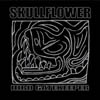 Although a rough stab at naming a genre, the UK "noise rock" scene started as a darker outgrowth of the distortion and effect laden shoegaze genre, though with more of a nod to proto-Industrialists like SPK, Whitehouse and Throbbing Gristle. As a scene it was rather incestuous, with many of the major artists such as Skullflower, Ramleh and Novatron often switching members between projects, and even connections with some of the more rock oriented bands like Godflesh, Cable Regime, and Bodychoke. If there was a definitive disc for this time, IIIrd Gatekeeper might just be it.
Although a rough stab at naming a genre, the UK "noise rock" scene started as a darker outgrowth of the distortion and effect laden shoegaze genre, though with more of a nod to proto-Industrialists like SPK, Whitehouse and Throbbing Gristle. As a scene it was rather incestuous, with many of the major artists such as Skullflower, Ramleh and Novatron often switching members between projects, and even connections with some of the more rock oriented bands like Godflesh, Cable Regime, and Bodychoke. If there was a definitive disc for this time, IIIrd Gatekeeper might just be it.
Maybe not their first album, IIIrd Gatekeeper is perhaps their most well known. The trio (at this time) of the band's only consistent member, guitarist Matthew Bower, alongside drummer and vocalist (if you count the occasional muffled groans as such) Stewart Dennison (who also did time in Ramleh), and bassist Anthony DiFranco (of Novatron/AX/JFK) crafted this hour long mix of murky, stoned out stabs at rock with a serious bend towards the experimental. Fittingly issued by Justin Broadrick's Head Dirt label back in 1992, the opening strains of guitar feedback, fuzzed out bass, and slow, pounding caveman drums on "Can You Feel It?" both makes for an appropriate question and a raison d'etre for the remaining hour or so. Throughout the track, the careful balance of hypnotic repetition meshed with subtle dynamics that consistently move along at a glacial pace is struck.
Tracks like the faster paced "Larks Tongues" manage to shift in dynamics even more, from the pummeling drums and bass that are met with vast open air spaces of unadulterated feedback and guitar abuse. "Center Puss" even displays a nod to the psychedelic with its lead guitar lines being fed through heavy wah and flange. At the same time, I can almost hear the nods to the US grunge scene that was contemporaneous to this album (at the very early stages when it was still relevant) in the muddy Black Sabbath inspired lurch of "Saturnalia" with overlaid feedback squeals.
Admittedly, there is not a great deal of change or variation from track to track on IIIrd Gatekeeper, nor should there be. It is one of the rare instances in which the simplicity in structure and minimal repetition are an asset, and not a liability, and each track shows enough dynamics throughout to remove the threat or fear of boredom from encroaching. Even the longer tracks, like "Godzilla" ape the prototypical "simplicity in excellis" approach of Velvet Underground, which showed that a simple theme amped up loud enough and pushed with enough vigor could just loom sonically and be compelling.
Although as a reissue it doesn't receive the full deluxe treatment with extra tracks or anything, the core of the album is still there and sounds cleaner than ever (based on my previous experience with tapes/MP3s of the original disc), and it comes packaged in an attractive mini-gatefold LP style jacket. The music is just as relevant now as it was some 15 years ago upon its original release, and perhaps even more so. The thick syrupy drones of Sunn O))) and the neo-shoegaze blur of A Place to Bury Strangers both owe a great deal to Skullflower's early ventures into the sludge, and kudos to Crucial Blast for making this classic available again. Now guys, maybe Xaman or Infinityland next?
samples:
Read More
- Administrator
- Albums and Singles
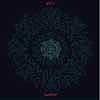 Kevin Hufnagel (Disrhythmia) and Colin Marston (Disrhythmia; Behold... the Arctopus; Infidel?/Castro!), collectively known as the New York ambient noise outfit Byla, team up with ex-Swans siren Jarboe for Viscera, an album of noise and acoustic soundscapes utilising the guitar as its main sound source. A year in the making, from spring 2006 to spring 2007, the five pieces on this CD have been carefully crafted by the Hufnagel/Marston duo to create an album full of atmospherics, harmonics, power, and above all richness, the whole complemented by Jarboe's vocal accents.
Kevin Hufnagel (Disrhythmia) and Colin Marston (Disrhythmia; Behold... the Arctopus; Infidel?/Castro!), collectively known as the New York ambient noise outfit Byla, team up with ex-Swans siren Jarboe for Viscera, an album of noise and acoustic soundscapes utilising the guitar as its main sound source. A year in the making, from spring 2006 to spring 2007, the five pieces on this CD have been carefully crafted by the Hufnagel/Marston duo to create an album full of atmospherics, harmonics, power, and above all richness, the whole complemented by Jarboe's vocal accents.
Alternating between amplified and acoustic compositions (three of the former and two of the latter), every track (each named after its respective running time) explores the richness of harmonics inherent in this particular stringed instrument. The three heavily amplified and distorted tracks—"15:35," "10:58," and "19:45"—are indeed visceral extended wall-of-sound six-stringed workouts, best heard on headphones so that the total sonic blanket can envelop the listener in a cocoon of noise. In "15:35" for example, sweeping forceful chording and subtle layering—along with a delicate ringing bell-like motif that comes in about half-way through—constantly builds one upon the other, creating tonalities that enhance and complement the main backdrop. "19:45," the standout track for me, starts out with a rapid-fire lead figure before exploding into a barrage of blistering fuzzed-out noise that completely pummels and sears through both ears scorchingly, to meet somewhere in the middle and melting any bits of gray matter that get in the way. Finally the blanket of noise gives way to searing feedback that constitutes the final two or three minutes of the piece. The style of subtly changing layering first manifested in "15:35" is continued here in a slow-rolling evolution, ensuring that the sound never remains static or redundant. The remaining noise track, "10:58," is very much in the same vein with the addition of lower-register growly vocals, infusing a demonic flavor into the meat of the piece.
Contrastingly—and quite startlingly so in some respects, given the rest of the album—"02:28" and "06:41" are entirely acoustic affairs. Of the two the latter is the better, opening with a miminalist plucked harmonic leading into some finger-style treated guitar providing both backdrop and counterpoint for Jarboe's ethereal voice. These two acoustic songs are almost like quiet interludes, intended to let you catch your breath before plunging you headlong once more into the maelstrom.
Admittedly I use the word mesmerizing quite often and I won't apologize for using it again in the context of this album. It is indeed a mesmerizing set of songs that batter and soothe by turns, and that both repels you with unadulterated power and then soothingly beguiles you with delicately soft tones. That aspect surprised me on the first hearing and I wasn't entirely convinced that it was a successful move, but having heard it three or four times since I now believe it to be one of the strengths of the album, emphasizing a) the range of the musical explorations of the musicians and b) their willingness to engage in a bit of risky experimentation. Many albums of a more mainstream nature seem to include a quiet track or two just for the sake of it, as a sop to variety and so-called musical breadth, rather than as a deliberate statement. This collaborative album is both a definite and considered statement, in other words that distorted guitar noise can be just as beautiful as the finest acoustic ballad.
samples:
Read More

